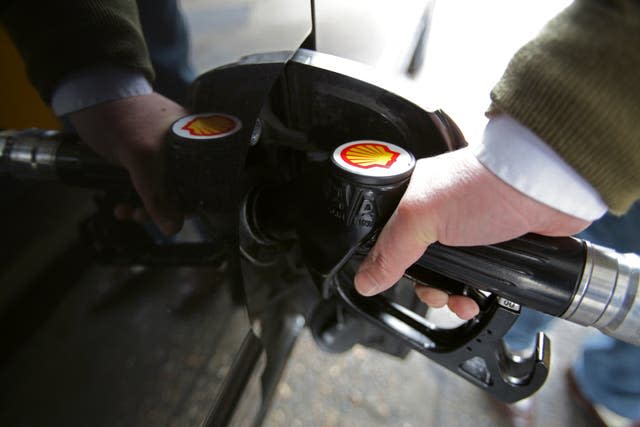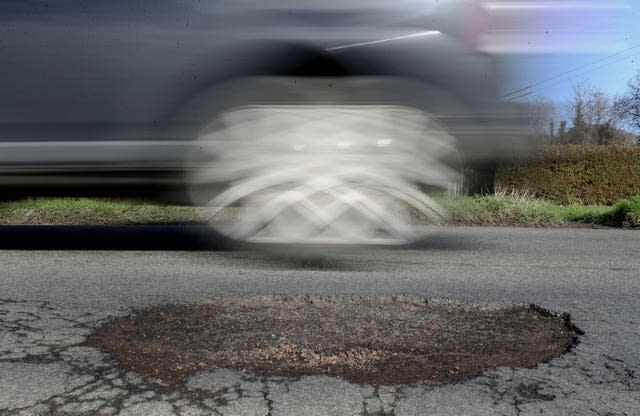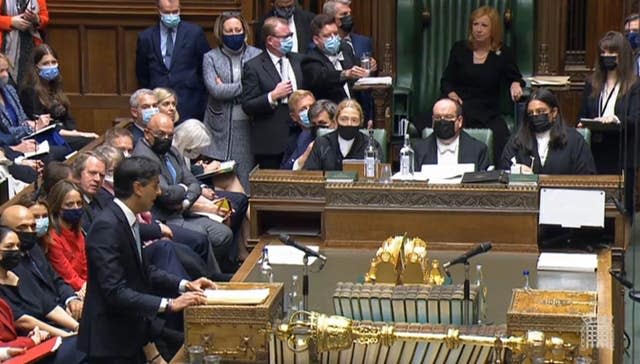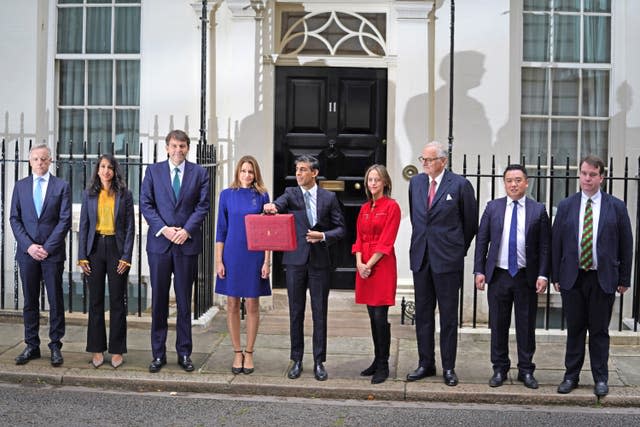Budget live: Chancellor sets out his spending plans
Live coverage as Chancellor Rishi Sunak delivers his Budget setting out plans for a post-coronavirus economy, boosted by better-than-expected forecasts but against a backdrop of a rising cost of living.
1.40pm
The Chancellor announced that the Universal Credit taper rate will be cut by 8% from no later than December 1, bringing it down from 63% to 55%.
He said: “The Universal Credit taper withdraws support as people work more hours. The rate is currently 63%, so for every extra £1 someone earns, their Universal Credit is reduced by 63p.
“Let us be in no doubt: this is a tax on work – and a high rate of tax at that.”

He added: “To make sure work pays, and help some of the lowest income families in the country keep more of their hard-earned money, I have decided to cut this rate, not by 1%, not by 2% – but by 8%.”
Mr Sunak said the tax cut would be worth more than £2 billion and would be introduced by no later than December 1.
The Chancellor then resumed his seat to cheers from Conservative members.
1.35pm
Mr Sunak said the planned fuel duty rise would be cancelled.
He told MPs: “With fuel prices at the highest level in eight years, I’m not prepared to add to the squeeze on families and small businesses.
“So I can confirm today the planned rise in fuel duty will be cancelled.

“That’s a saving over the next five years of nearly £8 billion.”
The Chancellor added public sector workers will also see “fair and affordable pay rises” across the whole Spending Review period.
He also confirmed an increase in the minimum wage next year to £9.50 an hour.
1.30pm
The Chancellor confirmed business rates would be retained and reformed, telling MPs: “We on this side of the House are clear that reckless, unfunded promises to abolish a tax which raises £25 billion every year are completely irresponsible.”

He said he was “radically” simplifying alcohol duty by introducing a system designed around the principle of “the stronger the drink, the higher the rate”.
Mr Sunak said he is ending the “irrational” 28% duty premium on sparkling wines and duty on fruit ciders will be cut and said steps would be taken to deliver the “most radical simplification of alcohol duties for over 140 years”.
Big, welcome reform to alcohol taxation. @theifs have indeed called it a mess. The mess is illustrated below, chart shows tax per unit alcohol for different sorts of drinks pic.twitter.com/UZr2yY6oGQ
— Paul Johnson (@PJTheEconomist) October 27, 2021
Mr Sunak said the planned increase in duty on spirits, wine, cider and beer will be cancelled.
1.25pm
Mr Sunak said now is “not the time to remove tax breaks on investment”, telling MPs: “I can confirm today that the £1 million Annual Investment Allowance will not end in December as planned, it will be extended all the way to March 2023.”
The Chancellor also explained he had previously announced a review of the bank surcharge within corporation tax.
He added: “Small challenger banks are improving banking competition, which is good for the sector and good for consumers.
“So to help them, I will also raise the annual allowance to £100 million.”
Mr Sunak said there will be a new 50% business rates discount in the retail, hospitality, and leisure sectors, with eligible concerns able to claim a discount on their bills of up to a maximum of £110,000.
1.20pm
A UK-wide £560 million numeracy programme, Multiply, will be set-up to help improve basic maths skills among millions of adults, Mr Sunak confirmed.
The new Multiply programme will help up to 500,000 adults improve their numeracy, transforming their prospects.#Budget2021 #SpendingReviewhttps://t.co/IGyII6JrMr pic.twitter.com/qCHRCBghVL
— HM Treasury (@hmtreasury) October 27, 2021
Mr Sunak said Brexit offered the UK the chance to deliver a “simpler” and “fairer” tax system, explaining he would reform the tonnage tax regime linked to shipping.
He told MPs: “When we were in the old EU system, ships in tonnage tax were required to fly the flag of an EU state. But that doesn’t make sense for an independent nation.

“So I can announce today that our tonnage tax will – for the first time ever – reward companies for adopting the UK’s merchant shipping flag, the Red Ensign. That is entirely fitting for a country with such a proud maritime history as ours.”
The Chancellor said flights between airports in England, Scotland, Wales and Northern Ireland will be subject to a new lower rate of Air Passenger Duty from April 2023.
Mr Sunak added: “We’re also making changes to reduce carbon emissions from aviation.
“Most emissions come from international rather than domestic aviation.”
1.11pm
The Chancellor, on transport funding, said £2.6 billion is committed via a “long-term pipeline” for more than 50 local road upgrades while more than £5 billion is being committed to local roads maintenance.
He told MPs: “Enough to fill one million more potholes a year.”

Mr Sunak said funding for buses, cycling and walking totals more than £5 billion adding: “The Prime Minister promised an infrastructure revolution – this Budget delivers an infrastructure revolution.”
The Chancellor said core science funding will rise to £5.9 billion a year by 2024-25, a cash increase of 37%.
He said the Government will maintain its target to increase research and development (R&D) investment to £22 billion, telling MPs: “But in order to get there, and deliver on our other priorities, we’ll reach the target in 2026-27 – spending, by the end of this Parliament, £20 billion a year on R&D. That’s a cash increase of 50%.”
1.05pm
Mr Sunak said tax relief for museums and galleries will be extended for two years, to March 2024.
He added: “To support theatres, orchestras, museums and galleries to recover from Covid, the tax reliefs for all those sectors will – from today until April 2023 – be doubled.
“And they won’t return to the normal rate until April 2024.”
He said the tax relief for culture is worth almost a quarter of a billion pounds.
Through the Barnett formula we're increasing Scottish Government funding, next year, by £4.6bn, Welsh Government funding by £2.5bn, and £1.6bn for the Northern Ireland Executive.
The largest block grants for the devolved administrations since the devolution settlements of 1998. pic.twitter.com/EavsFWVVuL
— Rishi Sunak (@RishiSunak) October 27, 2021
The Chancellor said he was allocating the first round of bids from the Levelling Up Fund, noting it would be £1.7 billion to “invest in the infrastructure of everyday life in over 100 local areas”.
He added: “With £170 million in Scotland, £120 million in Wales, and £50 million in Northern Ireland, more than their Barnett shares. This will benefit the whole United Kingdom.”
Mr Sunak said the Government is backing projects in Aberdeen, Bury, Burnley, Lewes, Clwyd South and Stoke-on-Trent – along with Labour areas of Ashton under Lyne, Doncaster, South Leicester, Sunderland and West Leeds.
1pm
The Chancellor announced £300 million for A Start for Life parenting programmes, with an extra £170 million by 2024/25 going into paying for childcare.
Mr Sunak said: “We are responding today with £300 million for a Start for Life offer for families, high-quality parenting programmes, tailored services to help with perinatal mental health, and, I’m pleased to tell (Conservative MP Fiona Bruce), funding to create a network of family hubs around the country too.
“To improve the quality of childcare, we’re going to pay providers more – with today’s Spending Review providing an extra £170 million by 2024-25.”
Up to 300,000 more families will benefit from an extra £200m investment in the Supporting Families programme.#Budget2021 #SpendingReview pic.twitter.com/Gg7IloZ0BL
— HM Treasury (@hmtreasury) October 27, 2021
Mr Sunak said the Spending Review also provides “£4.7 billion by 2024-25” for schools.
He said: “Combined with the ambitious plans we announced at Spending Review 2019, this will restore per pupil funding to 2010 levels in real terms – equivalent to a cash increase for every pupil of more than £1,500.
The Chancellor's big idea on early years is to reannounce Sure Start with a different name and less money – the Tories have no plan to fix the mess they've made #Budget21
— David Lammy (@DavidLammy) October 27, 2021
“And for children with special educational needs and disabilities we’re more than tripling the amount we invest to create 30,000 new school places.”
The Chancellor went on: “We’ve already announced £3.1 billion to help education recovery. Today, as promised by the Prime Minister and Education Secretary, we will go further – with just under £2 billion of new funding to help schools and colleges – bringing this Government’s total support for education recovery to almost £5 billion.”
12.56pm
The Chancellor said local government will get new grant funding over the next three years of £4.8 billion, the largest increase in core funding for over a decade.
Mr Sunak confirmed a levy will be placed on property developers with profits over £25 million at a rate of 4% to help create a £5 billion fund to remove unsafe cladding.
The Chancellor said he is providing an extra £2.2 billion for courts, prisons and probation services, including £500,000 to reduce the courts backlogs.
12.51pm
The Chancellor said borrowing as a percentage of GDP is forecast to fall, from 7.9% this year to 3.3% next year, then 2.4%, 1.7%, 1.7% and 1.5% in the following years.
Mr Sunak, on the vote on his fiscal responsibility charter, said MPs would face a “simple choice”.
I am publishing a new Charter for Budget Responsibility.
It sets out two fiscal rules which bind us to a path of discipline & responsibility.
Based on the tests the forecasts also show that we will return to spending 0.7% on overseas aid before the end of the Parliament. 👇 pic.twitter.com/ScYtkzOaI1
— Rishi Sunak (@RishiSunak) October 27, 2021
He told the Commons: “To abandon our fiscal anchor and leave our economy adrift with reckless unfunded pledges, or to vote for what we on this side of the House know is the right course, sound public finances and a stronger economy for the British people.”
Mr Sunak said the OBR report today shows the Government has met all of its fiscal rules.
The Chancellor said overseas aid would return to 0.7% of national income in 2024-25, before the end of the Parliament.
12.47pm
The Chancellor added the Budget will offer “further support for working families” and the Government’s fiscal policy will “keep in mind the need to control inflation”.
Mr Sunak said: “I have written to the Governor of the Bank of England today to reaffirm their remit to achieve low and stable inflation.”
The OBR has downgraded its unemployment forecast due to the coronavirus pandemic from 12% down to 5.2%, the Chancellor told MPs.

Mr Sunak said the OBR expects the UK’s “recovery to be quicker”, adding: “They forecast the economy to return to its pre-Covid level at the turn of the year – earlier than they thought in March.
“Growth this year is revised up from 4% to 6.5%. The OBR then expect the economy to grow by 6% in 2022, and 2.1%, 1.3% and 1.6% over the next three years.
“In July last year, at the height of the pandemic, unemployment was expected to peak at 12%. Today, the OBR expect unemployment to peak at 5.2%.
“That means over two million fewer people out of work than previously feared.”
The OBR has scaled down its assumption of the scarring effect of Covid-19 on the economy from 3% to 2%, the Commons heard.
12.41pm
The Chancellor has said inflation in September was 3.1 % and “is likely to rise further” due to pressures caused by supply chains and energy prices.
#Breaking Chancellor Rishi Sunak has said inflation in September was 3.1 % and “is likely to rise further” due to pressures caused by supply chains and energy prices pic.twitter.com/80HVRkouny
— PA Media (@PA) October 27, 2021
Mr Sunak said he would be extending the suspension of the HGV levy until 2023, while freezing vehicle excise duty for heavy goods vehicles.
12.40pm
Mr Sunak said the Budget was focused on the “post-Covid” era.
He told MPs: “Today’s Budget does not draw a line under Covid, we have challenging months ahead.
“And let me encourage everyone eligible to get their booster jabs right away. But today’s Budget does begin the work of preparing for a new economy post-Covid.
“The Prime Minister’s economy of higher wages, higher skills, and rising productivity. Of strong public services, vibrant communities and safer streets. An economy fit for a new age of optimism.
“Where the only limit to our potential is the effort we are prepared to put in and the sacrifices we are prepared to make.”
12.35pm
Mr Sunak has risen to deliver his Budget statement.
The Chancellor said: “I have listened very carefully to what you have said” after being admonished by Deputy Speaker Dame Eleanor Laing for Budget briefings.
He also told the Commons: “Employment is up. Investment is growing. Public services are improving. The public finances are stabilising. And wages are rising.

“Today’s Budget delivers a stronger economy for the British people: stronger growth, with the UK recovering faster than our major competitors.
“Stronger public finances, with our debt under control. Stronger employment, with fewer people out of work and more people in work. Growth up, jobs up, and debt down.
“Let there be no doubt – our plan is working.”
12.02pm
Sir Keir Starmer has tested positive for Covid-19 and will not be doing Prime Minister’s Questions or responding to the Budget, Labour has said.
Shadow business secretary Ed Miliband stood in for Sir Keir at Prime Minister’s Questions.
Mr Sunak was among those Conservative MPs wearing masks in the Commons chamber, although Commons Leader Jacob Rees-Mogg was not.
12.01pm
Boris Johnson is on his feet in the Commons for Prime Minister’s Questions. Mr Sunak is by his side and the House is packed with MPs ahead of his Budget address in about 30 minutes.
11.30am
Chancellor Rishi Sunak told Cabinet ministers the “three building blocks” of the Budget were “strong public services, infrastructure innovation and skills”.

A Downing Street spokesman said the Chancellor also pledged to use post-Brexit freedoms to deviate from EU rules to “deliver substantive reform of our tax system”.
The spokesman said: “The Chancellor outlined his plans for the Budget and Spending Review that will deliver a stronger economy for the British people, promoting high skills, high productivity and higher wages.
“He also set out how strong public services, infrastructure innovation and skills, and support for working families were the three building blocks of this Budget, emphasising that there would be strong investment in all three including £6 billion to help clear NHS backlogs and £3 billion investment in skills.”
11.10am
The Chief Secretary to the Treasury has announced he will not feature in the traditional pre-Budget photograph with the Chancellor as he is agoraphobic.
Simon Clarke tweeted that his condition “prevents me being comfortable in some open spaces” and so as a result would not take part in the shots outside No 11 Downing Street.
Really looking forward to explaining the Budget and SR alongside the Chancellor. I won’t be outside for the photos in Downing Street as I live with agoraphobia – which prevents me being comfortable in some open spaces – but will be busy in Parliament and out in the country 1/ pic.twitter.com/k7ifCgI7QO
— Simon Clarke MP (@SimonClarkeMP) October 27, 2021
The Treasury ministerial team is ritually photographed together outside the famous black door while the Chancellor holds up their Budget red box before the Commons fiscal speech.
11am
Rishi Sunak is expected to hail a “new age of optimism” in his Budget on Wednesday afternoon amid predictions he will have more money than expected to spend due to a fast bounce-back from the Covid-19 pandemic.
With less than 24 hours until #Budget2021 and #SpendingReview, Chancellor @RishiSunak has been busy making his final preparations.
You can watch the whole speech right here on our Twitter account at 12.40 tomorrow. pic.twitter.com/IFwFlvW1Sf
— HM Treasury (@hmtreasury) October 26, 2021


